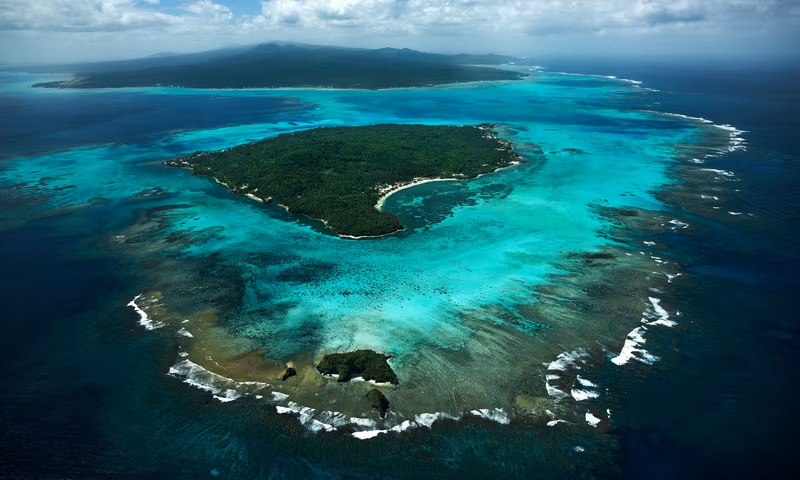Leaders take their pleas for stronger and more urgent action to the UN General Assembly
By Harry Pearl
Pacific nations delivered a clear message to the UN General Assembly this year: Climate action was failing to slow accelerating sea-level rise, but statehood would endure even if land territories did not.
Many Pacific island nations sit just a few meters above sea level, leaving them at risk of flooding, storm surges and coastal erosion that are forecast to increase in frequency as the planet warms. Some, like low-lying Tuvalu, are predicted to almost disappear by 2100.
Samoan Prime Minister Samoa’s Mata’afa said that in an era of unprecedented sea-level rise, international law must evolve to meet the climate crisis.
“Our statehood and sovereignty cannot be challenged,” she said in her address to the assembly on Friday. “No matter the physical changes wrought by the climate crisis, we will remain sovereign states unless we choose otherwise.”
In New York last week, the 39-member Alliance of Small Island States (AOSIS) issued a declaration to reaffirm that their rights as nations remain intact under international law, despite the challenges posed by rising sea levels.
AOSIS, which includes 14 Pacific members, said it hoped the declaration would influence the ongoing work of the International Law Commission on sea-level rise.
The announcement echoed a similar statement on the continuity of statehood made by the Pacific Islands Forum, the region’s peak diplomatic body, in 2023.
Both declarations were referenced throughout the week by Pacific nations, which have been sounding the alarm for decades on rising sea levels. The big question, however, is who is listening?
One after the other, leaders from the Pacific stood at the green-marbled lectern of the UN General Assembly and called for more urgent and stronger climate action, as well as easier access to climate finance.
“Once again, we urge the international community to promptly and dramatically act to restrict global warming to 1.5°C,” Tongan Prime Minister Siaosi Sovaleni said in his speech Friday.
“Industrialised nations must strengthen their emissions reduction commitments. We must ensure that climate finance is speedily and easily accessible to Pacific Island nations.
“Let there be no doubt, we are teetering on the brink of a climate catastrophe.”
On Tuesday, at a press conference on the margins of the general assembly, leaders from several Pacific islands nations were close to tears as they pressed for a just transition to a low-carbon economy.
Lenora Qereqeretabua, Fiji’s deputy speaker of parliament, said that wealthy fossil-fuel producing countries needed to take the lead on climate action.
“For those of us whose homes, whose traditional lands, whose fisheries and whose stories are being inundated by seawater, this is our very existence,” she said, apologising for becoming emotional.
The UN this year convened a high-level meeting on the threat of sea level rise, earning the praise of many Pacific leaders. But there is a regional push for the issue to become a “permanent” agenda item of the world parliament.
Tuvalu Prime Minister Feleti Teo said he hoped a more ambitious declaration on sea-level rise would be adopted by the assembly in September 2026.
Among its objectives, he said, would be affirmation that statehood cannot be challenged because of sea-level rise; that existing maritime zones would continue in perpetuity; and that the international community should establish clear pathways for climate migration.
Financing failures
The Blue Continent is heavily reliant on foreign aid for its development needs. Still, it struggles to access funding for climate mitigation and adaptation projects.
This week leaders made calls for reform and expansion of access to climate finance and for developed nations to live up to commitments under the Paris Accord.
“We call on the United Nations to look into this matter with urgency or we will utilize our rights to liquidate our forest and marine resources to achieve our development aspirations, including alleviating poverty,” Papua New Guinea’s Prime Minister James Marape said to the assembly.
In his speech, Vanuatu’s Prime Minister Charlot Salwai called for sweeping reforms of the Bretton Woods system of monetary management and finance.
“Vanuatu loses over half of its GDP every time a severe cyclone strikes,” he said on Friday.
“We remain at the front lines of a climate emergency that not only threatens our overall sustainable development, but time and again given the lack of affordable alternatives, we are forced to incur unsustainable levels of debt to financial recovery from national natural disasters.”
Frustrated with the global climate financing model, Pacific nations have established a Pacific Resilience Facility to cater to the needs of the region.
Last month in Tonga, UN Secretary-General António Guterres promised he would do his best to mobilize resources for the initiative.
But amid intense international disagreement about who should foot the bill for the impacts of climate change, it’s unclear when the facility will become operational – with funding still well short of the initial goal of US$500 million in capitalization by 2026.















